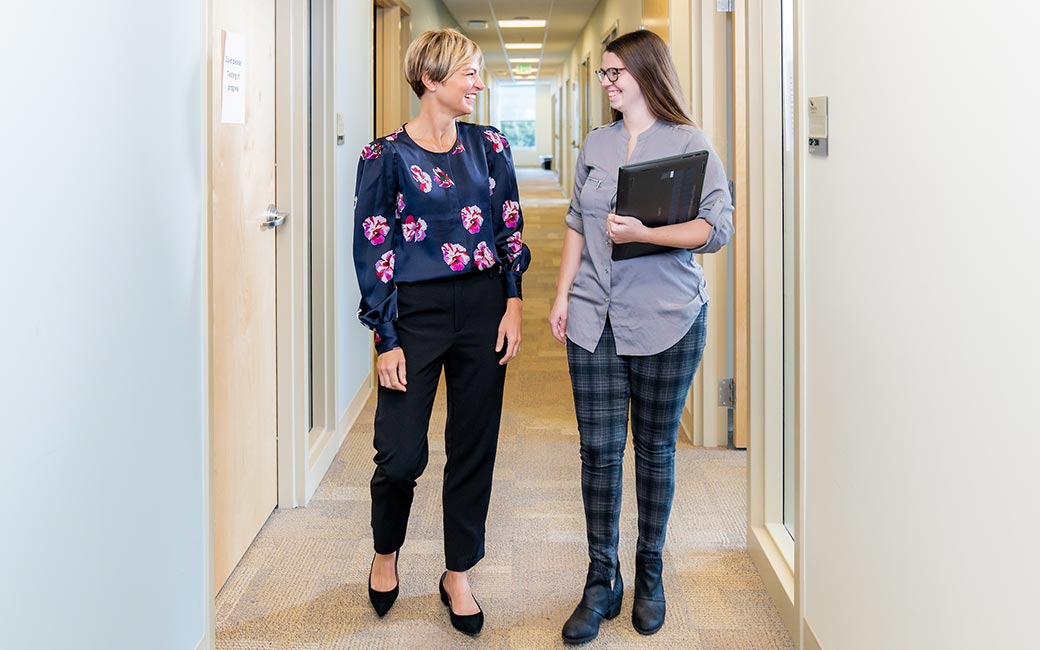Speech-language pathology faculty member awarded for brain injury work
Assistant professor, graduate student receive teaching, clinical research awards
By Rebecca Kirkman on December 5, 2022

Casey Keck, assistant professor in the Department of Speech-Language Pathology & Audiology at Towson University, focuses her research on improving communication skills in everyday
interactions for young people with brain injury.
At TU, she’s furthering this work—and the communities TU serves—by developing an interprofessional
practice where graduate speech-language pathology students deliver services to individuals
with brain injury through the Institute for Well-Being’s (IWB) Speech & Language Center.
Keck’s work in the area received the American Speech-Language-Hearing Association’s
(ASHA) 2022 Advancing Academic-Research Careers Award, which supports faculty in the discipline of communication sciences and disorders.
Keck is one of only 10 faculty members at universities across the country—and the
only in Maryland—to receive the award, which includes a $5,000 stipend.
“Dr. Keck’s award involves mentored opportunities to enhance both her teaching and
research, and she is planning some hands-on experiences for students in the College
of Health Professions,” says Department of Speech-Language Pathology & Audiology Chair
Kaitlyn Wilson.
Keck not only proposes to expand IWB’s services, but also implement training with
graduate students to prepare them for clinical work with health care professionals
across multiple disciplines.
“IWB has had interprofessional practice for years, where we have speech-language pathology
and other students from the College of Health Professions providing services together,”
Keck says. “This is something Towson does well, and that makes it easy for me to come
in and be a part of that. But what makes this program different is there will be training
in interprofessional practice first and then the students will apply it in a clinical
environment.”
Keck’s award-winning proposal lays the groundwork for a future clinical study aiming
to improve the social communication skills of adolescents with brain injury in real-world
contexts by engaging in community activities supported by a clinician, such as going
shopping at a store or eating at a restaurant.
“My research looks at adolescents with brain injury. They are one of the highest incidences
of traumatic brain injury, and more at risk as an age group,” says Keck, noting that
the IWB currently serves adults with brain injury. “The most debilitating consequences
of brain injury are social communication skills, and adolescence is a really complex
time in life with a lot of transitions—such as higher education, training for vocations—so
it’s a critical period to provide these services.”
In a testament to the exceptional mentorship and opportunities coming out of the department,
Keck wasn’t the only Tiger whose work was honored by the organization.
Speech-language pathology graduate student Courtney Segool ’23 received the 2022 Students Preparing for Academic and Research Careers Award, which includes a $1,000 stipend. She is the only student in Maryland and one of
just 12 across the country to receive the award.
Designed to fill gaps in the field of speech-language pathology, the award fosters
students’ interest in the pursuit of a Ph.D. and careers in academia.
Under Keck’s mentorship, Segool will refine the necessary skills for future doctoral
study. In the spring 2023 term, Segool will guest lecture in SPPA 604: Acquired Neurogenic
Language and Cognitive Disorders I. In addition to completing her graduate research
project on the diagnosis of acquired childhood aphasia, she will practice disseminating
her research findings by submitting to journals and presenting at conferences, including
the recent ASHA Convention in New Orleans.
“It’s great working with Dr. Keck because she has so much brain injury research experience,”
Segool says.
For Keck, mentoring Segool is a full-circle moment.
“I have mentors, too, in research and in teaching, and it feels so good that while
I’m being mentored to continue developing my skills, I’m also able to share what I
know with Courtney to help prepare her,” Keck says. “We have a real shortage of Ph.D.s
in our profession. It’s great that Courtney knows so early what she wants to do, so
we can prepare her to be part of a field where she’s so desperately needed.”